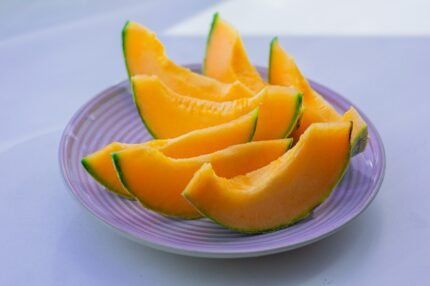Medically reviewed by Dr. Ramesh Gaddam, M.D. — Written by Sumalatha, D.N.H.E
Cantaloupe, scientifically known as Cucumis melo var. cantalupensis, is a widely enjoyed type of melon belonging to the Cucurbitaceae family.
This fruit is recognized for its sweet, juicy flesh and distinct musky aroma. Cantaloupe is characterized by its rough, netted rind, which can range in color from beige to tan.
Inside, the fruit boasts a vibrant orange flesh that is both succulent and fragrant, providing a refreshing treat that is particularly popular during the summer months.
Cantaloupe Nutrition
Here is a detailed nutritional profile of cantaloupe per 100 grams:
| Nutrient | Amount per 100g | % Daily Value (DV) |
|---|---|---|
| Calories | 34 kcal | 2% |
| Water | 90.2 g | – |
| Carbohydrates | 8.2 g | 3% |
| Sugars | 7.9 g | – |
| Dietary Fiber | 0.9 g | 4% |
| Protein | 0.8 g | 2% |
| Total Fat | 0.2 g | 0% |
| Vitamin A | 169 µg | 19% |
| Vitamin C | 36.7 mg | 41% |
| Vitamin B6 | 0.07 mg | 5% |
| Folate (Vitamin B9) | 21 µg | 5% |
| Potassium | 267 mg | 6% |
| Magnesium | 12 mg | 3% |
| Calcium | 9 mg | 1% |
| Iron | 0.2 mg | 1% |
| Phosphorus | 15 mg | 2% |
| Sodium | 16 mg | 1% |
Health Benefits of Cantaloupe
Potential Side Effects
While cantaloupe is generally safe and healthy for most people, there are a few potential side effects and considerations to keep in mind:

Allergic Reactions:
Some individuals may be allergic to cantaloupe. Symptoms of an allergic reaction can include itching, swelling, difficulty breathing, and hives.
Those with known allergies to related fruits, such as watermelon or cucumber, should be cautious.
Foodborne Illness:
Cantaloupe has been associated with outbreaks of foodborne illnesses such as Salmonella and Listeria.
To reduce the risk, wash the exterior of the melon thoroughly before cutting, and refrigerate cut pieces promptly.
Blood Sugar Levels:
Although cantaloupe has a relatively low glycemic index, it still contains natural sugars.
People with diabetes or those monitoring their blood sugar levels should consume cantaloupe in moderation and be mindful of their overall carbohydrate intake.
Digestive Issues:
For some individuals, the fiber content in cantaloupe may cause digestive issues such as bloating or gas, especially if consumed in large quantities.
Potassium Intake:
Cantaloupe is a good source of potassium.
While this is beneficial for most people, those with kidney disease or individuals taking certain medications (like potassium-sparing diuretics) should be cautious.
As excessive potassium intake can lead to hyperkalemia (high potassium levels in the blood).
Interference with Certain Medications:
The high vitamin C content in cantaloupe can sometimes interfere with the effectiveness of certain medications, such as statins (used for lowering cholesterol).
Consult with a healthcare provider if you are on such medications.
Caloric Intake:
While cantaloupe is low in calories, overconsumption can still contribute to excessive caloric intake, especially if consumed in conjunction with other high-calorie foods.
Portion control is important for maintaining a balanced diet.
By being aware of these potential side effects and taking appropriate precautions, you can enjoy the benefits of cantaloupe while minimizing any risks.
Uses of Cantaloupe
Cantaloupe is a versatile fruit that can be used in a variety of culinary and non-culinary ways.

Here are some common uses:
Culinary Uses
1. Fresh Consumption:

As a Snack: Enjoy cantaloupe slices or cubes as a refreshing and healthy snack.
Fruit Salads: Combine cantaloupe with other fruits like berries, watermelon, and pineapple for a colorful and nutritious fruit salad.
2. Smoothies and Juices:
Smoothies: Blend cantaloupe with yogurt, ice, and other fruits to create delicious and hydrating smoothies.
Juices: Cantaloupe can be juiced alone or mixed with other fruits and vegetables for a refreshing beverage.
3. Desserts:
Sorbet: Puree cantaloupe and freeze it to make a simple and refreshing sorbet.
Fruit Popsicles: Blend cantaloupe with a bit of honey and freeze in popsicle molds.
4. Breakfast Dishes:
Yogurt Parfaits: Layer cantaloupe with yogurt and granola for a nutritious breakfast parfait.
Cereal Topping: Add cantaloupe cubes to cereal or oatmeal for a sweet and juicy topping.
5. Savory Dishes:
Salads: Add cantaloupe to green salads along with ingredients like feta cheese, prosciutto, and mint for a sweet and savory combination.
Salsas: Mix diced cantaloupe with ingredients like tomatoes, onions, cilantro, and lime juice to create a fruity salsa.
6. Appetizers:
Prosciutto-Wrapped Cantaloupe: Wrap cantaloupe slices with prosciutto for a classic Italian appetizer.
Skewers: Create fruit skewers with cantaloupe, other melons, and berries for an easy and attractive appetizer.
Non-Culinary Uses
1. Skin Care:

Face Masks: The hydrating properties and vitamins in cantaloupe can be used in homemade face masks to moisturize and nourish the skin.
2. Decorative Uses:
Centerpieces: Hollow out a cantaloupe and use it as a natural bowl for serving fruit salads or as a decorative centerpiece filled with flowers.
Carvings: Cantaloupe can be carved into decorative shapes for fruit displays at events and parties.
3. Composting:
Food Waste Management: The rind and seeds of cantaloupe can be added to compost bins to create nutrient-rich compost for gardens.
Nutritional Uses
4. Hydration and Nutrient Boost:
Electrolyte Replacement: Due to its high water and potassium content, cantaloupe is excellent for rehydrating and replenishing electrolytes after physical activity or in hot weather.
5. Dietary Supplements:
Meal Supplements: For those needing a nutrient boost, cantaloupe can be added to meal replacement shakes or blended into soups.
Incorporating cantaloupe into your diet and lifestyle can provide both enjoyment and health benefits, making it a valuable addition in various forms.
Cantaloupe Benefits for Skin
Cantaloupe offers numerous benefits for skin health, thanks to its rich nutrient profile.

Hydration
Cantaloupe’s high water content helps keep the skin hydrated, promoting a supple and smooth complexion.
Vitamin C
Rich in vitamin C, cantaloupe boosts collagen production, which helps maintain skin elasticity and firmness.
Antioxidants
The antioxidants in cantaloupe, such as beta-carotene and vitamins A and C, protect the skin from oxidative stress and damage caused by free radicals.
Anti-Aging
Cantaloupe’s nutrients help combat signs of aging, such as wrinkles and fine lines, by promoting healthy skin cell regeneration.
Healing and Repair
The vitamins in cantaloupe aid in skin healing and repair, reducing inflammation and promoting faster recovery from skin damage.
UV Protection
Beta-carotene in cantaloupe offers some protection against UV radiation, reducing the risk of sunburn and skin damage.
Skin Brightening
Regular consumption of cantaloupe can help brighten the skin, giving it a healthy and radiant glow.
Cantaloupe Benefits for Stomach
Cantaloupe offers digestive benefits, aiding stomach health with its nutrient-rich composition and hydrating properties.

Hydration
Cantaloupe’s high water content helps hydrate the stomach lining, aiding digestion and preventing issues like constipation.
Fiber
Rich in fiber, cantaloupe promotes healthy digestion by regulating bowel movements and supporting gut health.
Digestive Enzymes
Cantaloupe contains digestive enzymes like bromelain, which aid in breaking down food and easing digestion.
Ulcer Prevention
The soothing properties of cantaloupe can help prevent and alleviate symptoms of stomach ulcers and gastritis.
Anti-Inflammatory
Cantaloupe’s anti-inflammatory properties can help reduce stomach inflammation and alleviate discomfort associated with digestive issues.
Cantaloupe Benefits for Sperm
Cantaloupe provides essential nutrients beneficial for sperm health, aiding in fertility and reproductive function.

Zinc
Cantaloupe is rich in zinc, a mineral essential for sperm production and maintaining healthy testosterone levels.
Vitamin C
The high vitamin C content in cantaloupe helps protect sperm from oxidative damage, improving sperm quality.
Hydration
Cantaloupe’s high water content helps maintain proper hydration levels, crucial for sperm motility and viability.
Antioxidants
Antioxidants in cantaloupe, such as beta-carotene, protect sperm from free radical damage, supporting overall reproductive health.
Folate
Cantaloupe contains folate, which plays a role in DNA synthesis and may enhance sperm quality and fertility.
Cantaloupe Benefits for Men
Cantaloupe offers various health benefits specifically advantageous for men, promoting overall well-being and vitality.

Prostate Health
The nutrients in cantaloupe support prostate health, potentially reducing the risk of prostate issues like enlargement.
Testosterone Levels
Cantaloupe’s zinc content helps maintain healthy testosterone levels, crucial for male reproductive health and vitality.
Cardiovascular Health
The potassium and fiber in cantaloupe contribute to heart health, supporting optimal blood pressure and cholesterol levels.
Muscle Function
Potassium in cantaloupe aids muscle function, making it beneficial for men engaged in physical activities and workouts.
Hydration
Cantaloupe’s high water content helps men stay hydrated, supporting overall health and performance, especially during exercise.
Cantaloupe Benefits for Women
Cantaloupe offers several health benefits tailored to women’s needs, supporting overall well-being and vitality.

Skin Health
Cantaloupe’s vitamins A and C promote healthy skin, aiding collagen production and reducing signs of aging.
Bone Health
The vitamin K in cantaloupe supports bone health, potentially reducing the risk of osteoporosis in women.
Hydration
Cantaloupe’s high water content helps women stay hydrated, supporting overall health and wellness.
Iron Absorption
The vitamin C in cantaloupe enhances iron absorption, important for women to prevent anemia and maintain energy levels.
Menstrual Health
Cantaloupe’s nutrients support menstrual health, potentially reducing symptoms like bloating and cramps.
Cantaloupe Benefits for Weight Loss
Cantaloupe is a low-calorie, nutrient-dense fruit that can support weight loss goals with its various benefits.

Low Calorie Density
Cantaloupe is low in calories but high in water content, making it filling without contributing many calories.
Fiber Content
The fiber in cantaloupe aids digestion, promotes feelings of fullness, and helps regulate appetite, supporting weight management.
Hydration
Cantaloupe’s high water content helps keep you hydrated, which can reduce feelings of hunger and support weight loss.
Natural Sweetness
Cantaloupe satisfies cravings for sweets with its natural sweetness, helping to curb unhealthy snack choices.
Nutrient Density
Despite being low in calories, cantaloupe is rich in essential nutrients, providing vitamins and minerals important for overall health during weight loss.
Cantaloupe Benefits for Diabetes
Cantaloupe offers benefits for individuals with diabetes, providing a tasty option while supporting blood sugar control.

Low Glycemic Index
Cantaloupe has a low glycemic index, causing a slower rise in blood sugar levels compared to high-glycemic foods.
High Fiber Content
The fiber in cantaloupe slows down digestion and sugar absorption, helping to stabilize blood sugar levels.
Hydration
Cantaloupe’s high water content helps prevent dehydration, a common concern for individuals with diabetes.
Nutrient Rich
Cantaloupe is rich in essential vitamins and minerals, providing nutrients without spiking blood sugar levels.
Portion Control
Moderate servings of cantaloupe can be incorporated into a diabetes-friendly diet without causing significant blood sugar spikes.
Cantaloupe Benefits for Hair
Cantaloupe offers several benefits for hair health, providing nutrients that promote growth, strength, and overall vitality.

Vitamin A
Cantaloupe’s vitamin A content promotes sebum production, keeping the scalp moisturized and aiding hair growth.
Vitamin C
The vitamin C in cantaloupe aids collagen production, which strengthens hair follicles and reduces the risk of breakage.
Hydration
Cantaloupe’s high water content helps keep the scalp hydrated, preventing dryness and flakiness.
Antioxidants
Antioxidants in cantaloupe protect hair follicles from damage caused by free radicals, promoting healthy hair growth.
Biotin
Cantaloupe contains biotin, a B-vitamin essential for hair growth and overall scalp health.
Cantaloupe Benefits for Breastfeeding
Cantaloupe offers benefits for breastfeeding mothers, providing essential nutrients that support lactation and overall health.

Hydration
Cantaloupe’s high water content helps keep breastfeeding mothers hydrated, which is essential for milk production.
Vitamin C
The vitamin C in cantaloupe boosts the immune system, supporting overall health during breastfeeding.
Vitamin A
Cantaloupe’s vitamin A content promotes postpartum tissue repair and supports healthy skin and vision.
Folate
Cantaloupe contains folate, which is important for preventing birth defects and supporting maternal health during breastfeeding.
Energy Boost
The natural sugars in cantaloupe provide a quick energy boost for breastfeeding mothers, helping combat fatigue.
Frequently Asked Questions
Users frequently searched for:
What does cantaloupe do for the body?
Cantaloupe provides hydration, vitamins, minerals, and antioxidants, supporting overall health, digestion, skin, and immune function.
Is it okay to eat cantaloupe every day?
In moderation, eating cantaloupe daily is generally safe and beneficial due to its nutrient-rich composition and low calorie content.
Why is cantaloupe good for men?
Cantaloupe supports men’s health by promoting prostate health, maintaining testosterone levels, and aiding muscle function.
Which melon is the healthiest?
Watermelon and cantaloupe are both nutritious, but watermelon has a higher water content, while cantaloupe offers more vitamins and minerals.
Is cantaloupe high in sugar?
Cantaloupe contains natural sugars, but it’s relatively low in sugar compared to some other fruits. Moderation is key.
Which is better watermelon or cantaloupe?
Both fruits offer health benefits, but watermelon is higher in water content, while cantaloupe provides more vitamins and minerals.
Is cantaloupe a cheap fruit?
Cantaloupe is often affordable, especially during peak season, making it a budget-friendly fruit option.
What is the difference between cantaloupe and melon?
Cantaloupe is a type of melon, specifically a variety of muskmelon. Other melons include honeydew, watermelon, and casaba.
Is it healthy to eat melons every day?
Eating melons daily can be part of a healthy diet, providing hydration, vitamins, minerals, and antioxidants, but variety is important.
Also Read:
10 Health Benefits of Purslane for Skin, Liver and More
Peaches: Benefits, Nutrition, Uses, Side Effects
Medically reviewed by Dr. Ramesh Gaddam, M.D.

General Physician, Diabetologist, and Critical Care Specialist.
Discover more from Health Build-Up
Subscribe to get the latest posts sent to your email.


2 thoughts on “11 Potential Health Benefits of Cantaloupe & [Side Effects]”
Comments are closed.